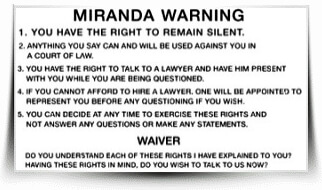If you’ve been read a Miranda Warning from a police officer, then you’ve likely been arrested. When arrested, the police will want to question you about your “alleged” criminal activity or any involvement in a crime they are investigating. If arrested, you may be read your Miranda Rights. Prior to questioning, police should give you some preliminary advice called Miranda Warnings. We encourage you to read our bail FAQ and contact a criminal attorney if you need additional help deciphering this information, as well, if you’re ever arrested.
The Following Breaks Down Each Miranda Warnings Statement for You:
-
“You have the right to remain silent.”
This means that you are legally entitled to refuse to answer any questions at all. You may think that if you refuse to answer questions, you will look guilty. The law protects you, however, because a refusal to answer questions cannot be admitted in court if you were under arrest at the time you refused. In other words, the jury will never know that you refused to answer questions so they can’t hold it against you.
-
“Anything you say may be used against you in a court of law.”
This means that anything you tell the police may be testified to in court. If you say something damaging (incriminating), anyone who heard you say it will testify in court, repeating to the jury what you said to the police. This is why an oral statement can be as damaging to you as a written confession.
-
“You have the right to an attorney.”
You need not be alone in the police station. You are entitled to have a lawyer there with you during any police questioning. If there is someone else — parent or a non-lawyer — whom you want to be with you, ask the police if he or she may be present during questioning. The police do not have to agree, but if they don’t, that is another good reason not to give a statement.
-
“If you cannot afford an attorney. one will be appointed for you.”
If you are indigent, the police will call a Public Defender lawyer to be with you at the station. Usually, a Public Defender is not appointed until your arraignment in court. However, if you do want to make a statement, or if you do not know whether you want to make a statement or not, the police will ask a Public Defender to come to the station to consult with you. If no Public Defender is available, wait until you get to court. Do not make a statement just because there is no lawyer available. If giving a confession would help you get a good deal now, which it usually will not, it will help you just as much or more later. The important thing to remember is that there is nothing you can do by yourself in the police station that a lawyer could not do as well or, more likely, better, since s/he is trained for this purpose. You can only hurt your case by giving a confession.
-
“You have the right to stop the questioning at any time.”
If you begin to give a statement, or confession, you may stop answering questions at any time. Just because you begin does not mean you are “stuck” with your decision. If you change your mind at any time or become unsure, stop answering questions. Occasionally, it may be true that giving a statement will help your case. In that event, a lawyer will insure that you give a statement which will help your case the most. It never hurts to have a lawyer with you, even while you are giving a statement to the police.

If a friend or loved one has been arrested please read through JailGuide article about being Mirandized.
For the history of Miranda Warnings and on being Mirandized, please visit: this Wiki.
If you’ve been read your Miranda Warnings, you’ve Been Mirandized; What to do Next!
Another right, which the police may not tell you about, is the right to make a telephone call. You should always let someone know that you are in the police station under arrest. The best person to call is a criminal attorney. If you do not know a lawyer, or cannot afford a lawyer, call the Public Defenders Office.
If you cannot reach a lawyer, call someone whom you trust to call a lawyer for you. Make sure that the person you call knows exactly which police station you are being held at. If the person you call is going to telephone a lawyer for you, make sure he or she knows it is important that a lawyer come down to the station as soon as possible. If your lawyer is not available, call another one, you can also ask a bondsman to give a lawyer referral.
